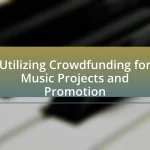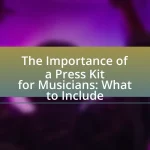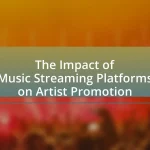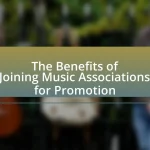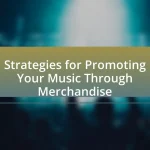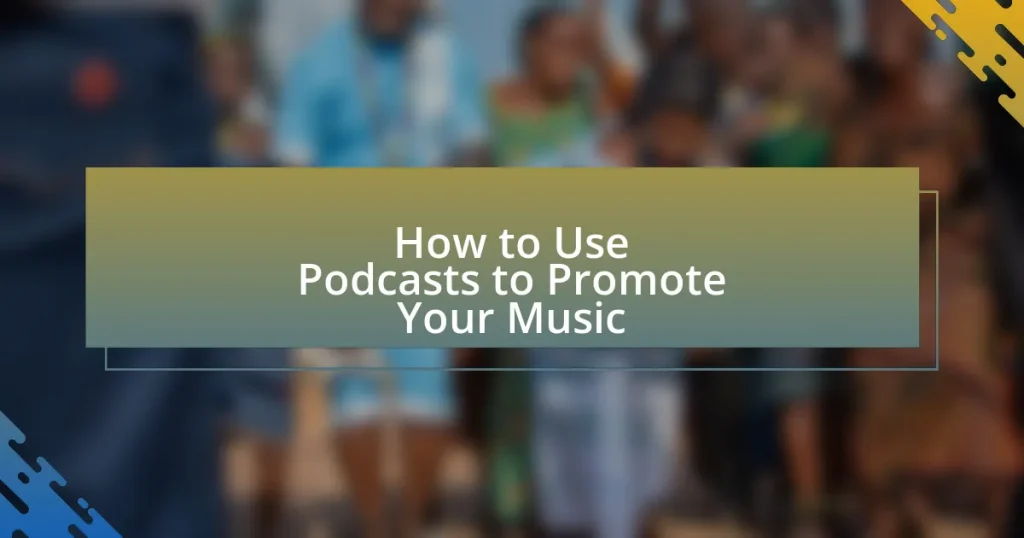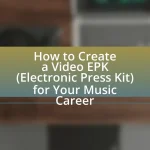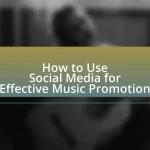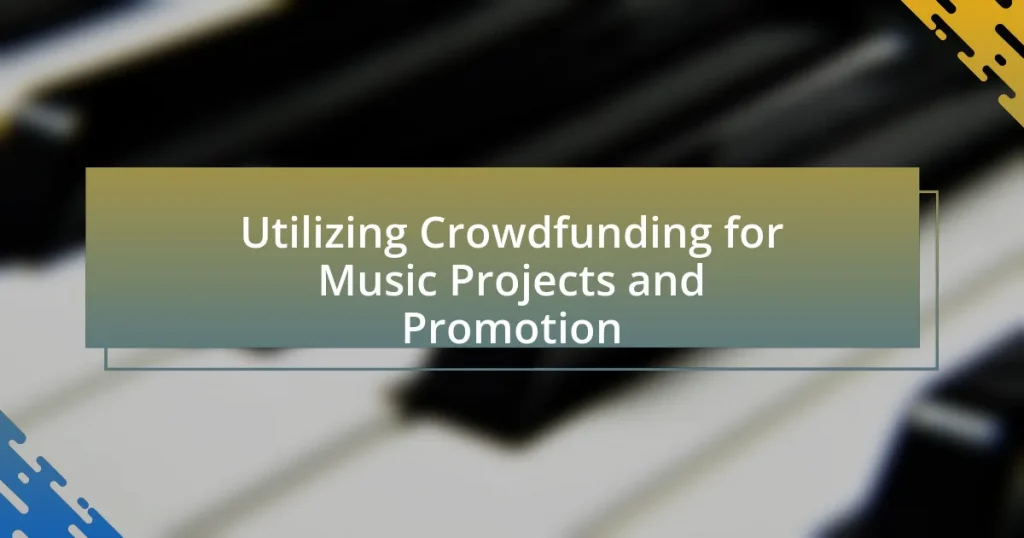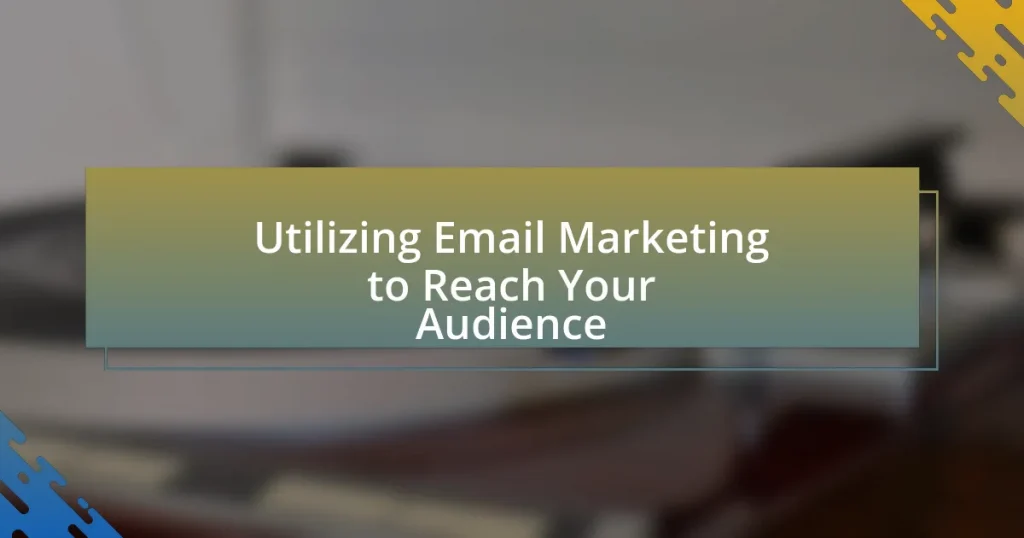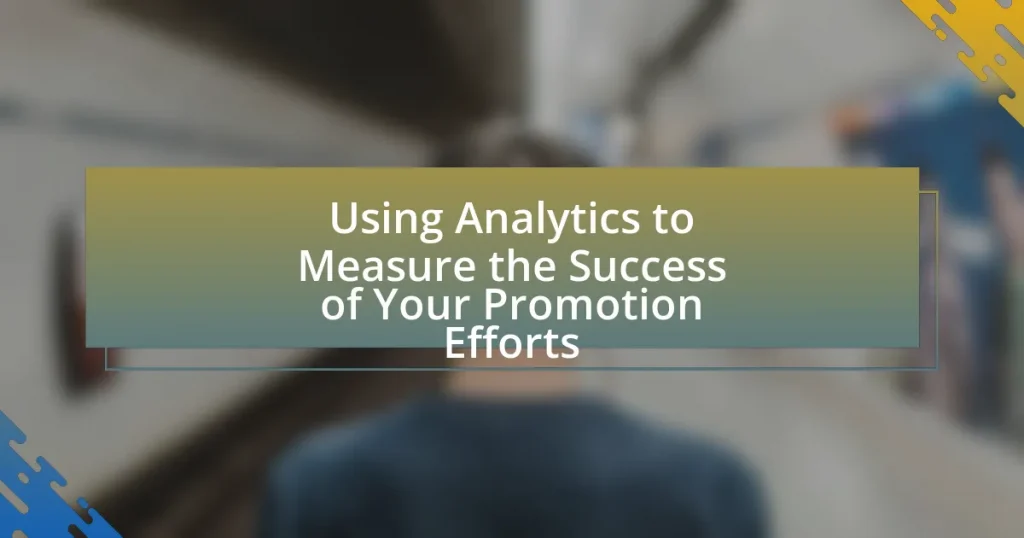Podcasts serve as an effective platform for promoting music by allowing artists to share their stories, engage with audiences, and showcase their work. The article explores the unique advantages of podcasts, including their ability to reach niche audiences and foster emotional connections through storytelling. It outlines strategies for identifying suitable podcasts, crafting compelling pitches, and preparing engaging content for appearances. Additionally, the article discusses best practices for audience engagement, follow-up actions post-appearance, and the importance of leveraging social media to amplify reach. Finally, it addresses common challenges in podcast promotion and offers tips for maintaining authenticity while effectively promoting music.
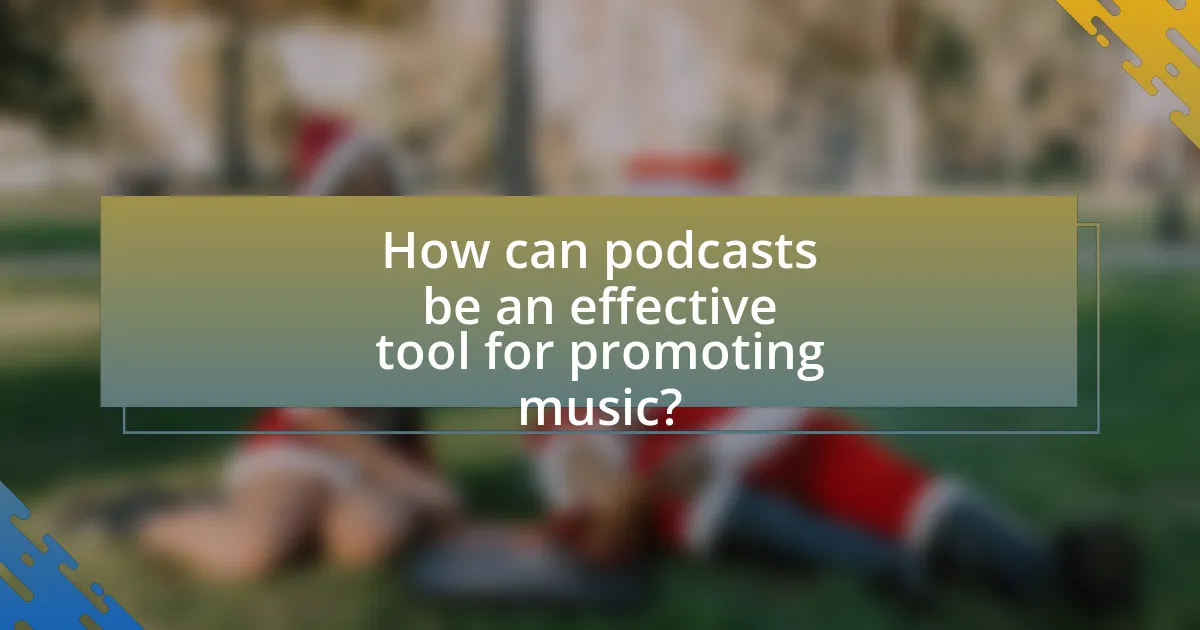
How can podcasts be an effective tool for promoting music?
Podcasts can be an effective tool for promoting music by providing artists with a platform to share their stories, engage with audiences, and showcase their work. Through interviews and discussions, musicians can connect with listeners on a personal level, fostering a deeper emotional connection to their music. Additionally, podcasts often have dedicated audiences, which can lead to increased exposure and potential fan growth. For instance, a study by Edison Research found that 55% of podcast listeners are more likely to purchase music from artists featured on their favorite shows, demonstrating the direct impact podcasts can have on music sales and streaming.
What are the unique advantages of using podcasts for music promotion?
Podcasts offer unique advantages for music promotion, primarily through their ability to engage niche audiences and create deeper connections with listeners. This medium allows artists to share their stories, inspirations, and behind-the-scenes insights, fostering a personal relationship with fans. According to Edison Research, 41% of Americans aged 12 and older have listened to a podcast in the past month, indicating a growing audience that artists can tap into. Additionally, podcasts often feature music in a context that enhances its appeal, such as interviews or thematic discussions, which can lead to increased listener interest and streaming. This combination of targeted reach and personal storytelling makes podcasts an effective tool for music promotion.
How do podcasts reach diverse audiences compared to traditional media?
Podcasts reach diverse audiences more effectively than traditional media by leveraging niche content and on-demand accessibility. Unlike traditional media, which often targets broad demographics through scheduled programming, podcasts cater to specific interests and communities, allowing creators to engage with listeners who share particular passions or backgrounds. For instance, according to Edison Research, 55% of podcast listeners report discovering new content that aligns with their interests, highlighting the medium’s ability to connect with varied audience segments. Additionally, the global reach of podcasts enables creators to transcend geographical barriers, making it easier to engage with international audiences compared to localized traditional media outlets.
What role does storytelling play in engaging listeners with music?
Storytelling plays a crucial role in engaging listeners with music by creating emotional connections and enhancing the overall experience. When artists incorporate narratives into their music, they provide context that allows listeners to relate personally to the themes and emotions expressed in the songs. Research indicates that songs with strong storytelling elements can evoke deeper emotional responses, leading to increased listener engagement and retention. For example, a study published in the Journal of Music and Emotion found that narratives in lyrics significantly enhance listeners’ emotional involvement, making them more likely to remember and share the music.
How do you identify the right podcasts for your music genre?
To identify the right podcasts for your music genre, start by researching podcasts that specifically focus on your genre or related styles. Utilize platforms like Apple Podcasts, Spotify, or Google Podcasts to search for keywords associated with your music, such as genre names or specific themes.
Next, analyze the podcast’s content, audience engagement, and guest features to ensure alignment with your music style. For example, if you create indie rock music, look for podcasts that regularly feature indie artists or discuss indie music trends.
Additionally, check the podcast’s social media presence and listener reviews to gauge its popularity and relevance within your genre. This method is effective because targeted podcasts often have established audiences that are more likely to appreciate and promote your music.
What criteria should you consider when selecting podcasts?
When selecting podcasts, consider the relevance of the podcast’s content to your music genre and target audience. A podcast that aligns with your musical style will likely attract listeners who are more interested in your work. Additionally, evaluate the podcast’s audience size and engagement metrics, as a larger and more engaged audience can lead to greater exposure for your music. Research the host’s credibility and influence within the music community, as their endorsement can significantly impact listener perception. Finally, assess the podcast’s format and frequency to ensure it fits your promotional strategy, as regular features can provide sustained visibility.
How can you research and evaluate potential podcasts for collaboration?
To research and evaluate potential podcasts for collaboration, identify podcasts that align with your music genre and audience. Utilize platforms like Apple Podcasts, Spotify, and social media to search for relevant shows, paying attention to their content, listener demographics, and engagement levels. Analyze metrics such as download numbers, listener reviews, and social media presence to gauge their influence and reach. Additionally, consider the podcast’s previous guests and topics to ensure compatibility with your music and message. This method is effective as it allows for targeted outreach to podcasts that can genuinely amplify your promotional efforts.
What strategies can you use to effectively promote your music on podcasts?
To effectively promote your music on podcasts, you can utilize strategies such as guest appearances, targeted advertising, and collaboration with podcast hosts. Guest appearances allow you to reach new audiences by sharing your music and story, while targeted advertising can place your music in front of specific demographics that align with your genre. Collaborating with podcast hosts can lead to exclusive features or interviews, enhancing your visibility. According to a 2021 report by Edison Research, 41% of Americans aged 12 and older have listened to a podcast in the past month, indicating a significant audience for music promotion through this medium.
How can you craft a compelling pitch for podcast hosts?
To craft a compelling pitch for podcast hosts, focus on clearly articulating your unique value proposition and how it aligns with their audience. Begin by researching the podcast’s theme and previous episodes to tailor your message, demonstrating an understanding of their content and audience interests. Highlight specific aspects of your music that resonate with the podcast’s niche, such as themes, stories, or experiences that can engage listeners. Additionally, provide concrete examples of your previous successes, such as audience engagement metrics or notable collaborations, to establish credibility. This approach not only showcases your relevance but also increases the likelihood of capturing the host’s interest.
What types of content should you prepare for podcast appearances?
To prepare for podcast appearances, you should focus on content that showcases your music, shares your personal story, and provides insights into your creative process. This includes having audio samples of your songs ready for playback, discussing the themes and inspirations behind your music, and sharing anecdotes that highlight your journey as an artist. Additionally, preparing talking points about your latest projects, upcoming performances, and any collaborations can engage listeners and encourage them to explore your work further. Research indicates that personal storytelling in interviews can significantly enhance listener connection, making your content more relatable and memorable.
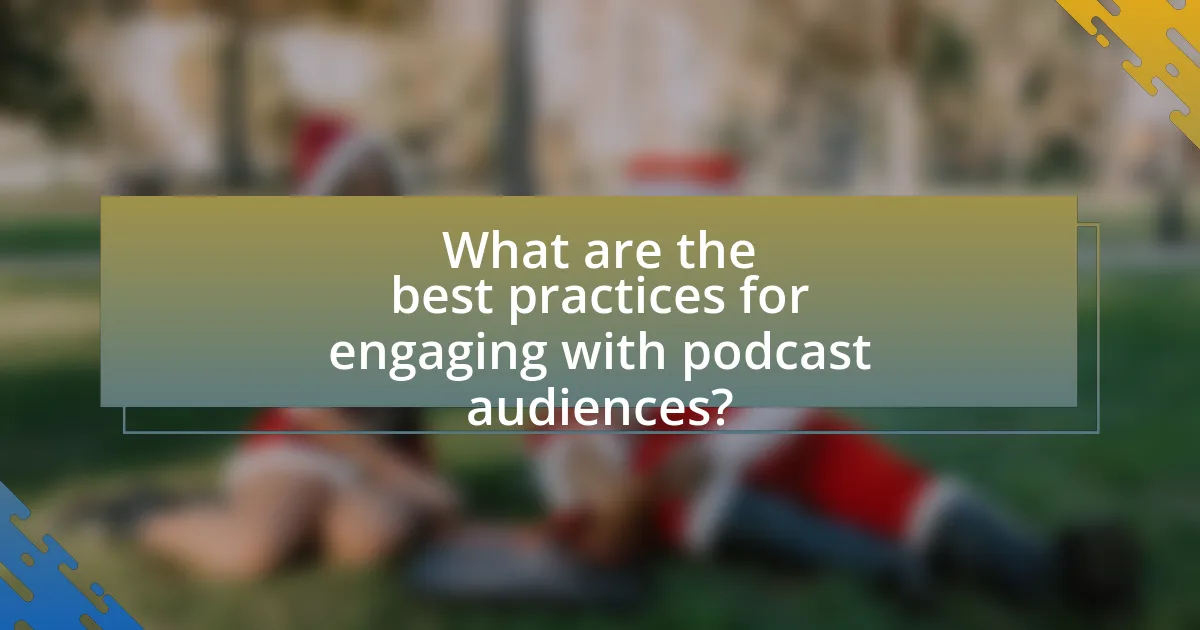
What are the best practices for engaging with podcast audiences?
The best practices for engaging with podcast audiences include creating compelling content, fostering community interaction, and utilizing social media for promotion. Compelling content captures listeners’ attention and keeps them coming back; for instance, storytelling and interviews with interesting guests can enhance engagement. Fostering community interaction, such as encouraging listener feedback and questions, builds a loyal audience; research shows that podcasts with active listener engagement see higher retention rates. Utilizing social media platforms to promote episodes and interact with listeners can significantly expand reach; statistics indicate that 75% of podcast listeners are active on social media, making it an effective tool for audience engagement.
How can you create a memorable experience for podcast listeners?
To create a memorable experience for podcast listeners, focus on delivering high-quality content that resonates emotionally with the audience. Engaging storytelling, relatable themes, and authentic conversations can significantly enhance listener connection. Research indicates that podcasts with compelling narratives and personal anecdotes lead to higher listener retention rates, as they foster a sense of intimacy and trust. Additionally, incorporating interactive elements, such as listener questions or feedback segments, can further personalize the experience, making listeners feel valued and involved.
What techniques can enhance your storytelling during interviews?
To enhance storytelling during interviews, musicians should employ techniques such as using vivid imagery, incorporating personal anecdotes, and maintaining a conversational tone. Vivid imagery helps listeners visualize the story, making it more engaging; for example, describing the setting of a song’s inspiration can create a strong mental picture. Personal anecdotes add authenticity and relatability, allowing the audience to connect emotionally with the musician’s journey. Maintaining a conversational tone fosters a relaxed atmosphere, encouraging open dialogue and making the storytelling feel more natural. These techniques are supported by research indicating that storytelling enhances audience engagement and retention, as demonstrated in studies on communication effectiveness.
How can you encourage listeners to connect with your music after the episode?
To encourage listeners to connect with your music after the episode, provide clear calls to action, such as directing them to your social media profiles, music streaming platforms, or website. Engaging with listeners through these channels fosters a sense of community and allows them to explore your music further. Research indicates that artists who actively promote their social media and music links during podcasts see a significant increase in follower engagement and streaming numbers, with studies showing that 70% of podcast listeners are likely to follow up on recommendations made during episodes.
What follow-up actions should you take after appearing on a podcast?
After appearing on a podcast, you should engage in several follow-up actions to maximize the impact of your appearance. First, share the episode on your social media platforms to reach your audience and encourage engagement. This can increase visibility and drive traffic to the podcast. Next, thank the host publicly, which fosters goodwill and may lead to future collaborations. Additionally, consider reaching out to listeners who engaged with your content, as this can build a community around your music. Finally, analyze the episode’s performance metrics, such as downloads and listener feedback, to assess its effectiveness and inform future promotional strategies. These actions are supported by the fact that social media sharing can increase audience reach by up to 50%, and engaging with listeners can enhance fan loyalty.
How can you leverage social media to amplify your podcast appearance?
To leverage social media for amplifying your podcast appearance, share engaging content related to the episode across your social media platforms. This includes posting audio snippets, quotes, and behind-the-scenes insights that highlight key discussion points. Research indicates that posts with visuals receive 94% more engagement than those without, making it essential to include eye-catching graphics or video clips. Additionally, tagging the podcast host and relevant guests can expand your reach, as their followers may engage with your content, further increasing visibility. Engaging with comments and encouraging your audience to share the episode can also enhance its reach, as social media algorithms favor content with higher interaction rates.
What metrics should you track to measure the impact of your podcast promotion?
To measure the impact of your podcast promotion, track metrics such as listener growth, engagement rates, and conversion rates. Listener growth indicates how many new listeners are attracted to your podcast as a result of promotional efforts, while engagement rates, measured through metrics like average listen duration and episode shares, reflect how well your content resonates with the audience. Conversion rates, which track actions taken by listeners such as visiting your music website or purchasing music, provide insight into the effectiveness of your promotion in driving desired outcomes. These metrics collectively offer a comprehensive view of your podcast’s promotional impact.
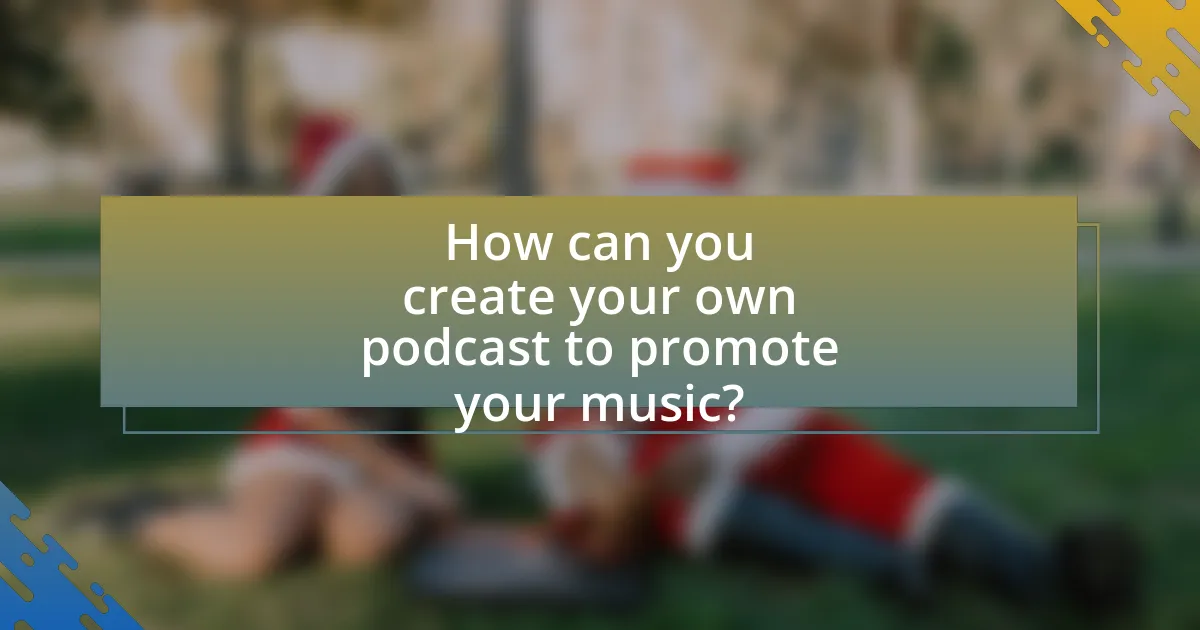
How can you create your own podcast to promote your music?
To create your own podcast to promote your music, start by defining your podcast’s theme and target audience, focusing on topics related to your music genre and personal experiences. Next, select a recording platform, such as Audacity or GarageBand, to record and edit your episodes, ensuring high audio quality. After recording, choose a podcast hosting service like Libsyn or Podbean to distribute your episodes to platforms like Spotify and Apple Podcasts. Promote your podcast through your social media channels and music platforms to reach your audience effectively. According to a 2021 report by Edison Research, 41% of Americans aged 12 and older have listened to a podcast in the past month, indicating a growing audience for podcasts that can help promote your music.
What are the essential steps to start your own music podcast?
To start your own music podcast, follow these essential steps: define your niche, plan your content, choose the right equipment, record and edit your episodes, and promote your podcast. Defining your niche involves identifying the specific genre or theme of music you want to focus on, which helps attract a targeted audience. Planning your content includes outlining episode topics, guest interviews, and segment formats to ensure a consistent flow. Choosing the right equipment, such as a quality microphone and audio interface, is crucial for producing clear sound. Recording and editing your episodes using software like Audacity or GarageBand allows you to refine your audio before publishing. Finally, promoting your podcast through social media, music forums, and collaborations with other podcasters helps increase visibility and grow your listener base.
How do you choose a theme and format for your podcast?
To choose a theme and format for your podcast, first identify your target audience and the specific music genre you want to promote. This focus allows you to create content that resonates with listeners. For example, if your podcast targets indie music fans, your theme could revolve around emerging artists and their stories.
Next, select a format that suits your theme, such as interviews, storytelling, or roundtable discussions. Research shows that podcasts with a clear format, like “The Talkhouse Music Podcast,” which features musicians discussing their work, tend to engage audiences effectively. This structured approach not only enhances listener retention but also establishes a consistent brand identity for your podcast.
What equipment and software do you need to produce a quality podcast?
To produce a quality podcast, you need a good microphone, audio interface, headphones, and recording/editing software. A quality microphone, such as the Audio-Technica AT2020, ensures clear audio capture, while an audio interface like the Focusrite Scarlett 2i2 connects the microphone to your computer and improves sound quality. High-quality headphones, such as the Sony MDR-7506, allow for accurate monitoring of audio during recording and editing. For software, programs like Audacity or Adobe Audition provide essential tools for recording, editing, and mixing audio, enabling a polished final product. These components are essential for achieving professional sound quality in podcasting.
How can you effectively market your podcast to reach a wider audience?
To effectively market your podcast and reach a wider audience, utilize social media platforms to promote episodes and engage with listeners. Research indicates that 75% of podcast listeners are active on social media, making it a vital channel for outreach. Create shareable content, such as audiograms or quotes from episodes, to encourage sharing and increase visibility. Collaborating with other podcasters or influencers in your niche can also expand your reach, as cross-promotion exposes your podcast to new audiences. Additionally, optimizing your podcast for search engines through relevant keywords in titles and descriptions can enhance discoverability, as 50% of podcast listeners discover new shows through search engines.
What promotional strategies can help grow your podcast listener base?
To grow your podcast listener base, utilize social media marketing, collaborations with other podcasters, and targeted advertising. Social media platforms like Instagram and Twitter allow for direct engagement with potential listeners, increasing visibility and attracting new audiences. Collaborating with other podcasters can introduce your content to their established listener base, effectively expanding your reach. Additionally, targeted advertising on platforms such as Facebook and Google can help you reach specific demographics interested in your podcast’s niche, leading to higher listener acquisition rates. According to a 2021 report by Edison Research, 41% of podcast listeners discover new shows through social media, highlighting the effectiveness of these promotional strategies.
How can collaborations with other podcasters enhance your reach?
Collaborations with other podcasters can significantly enhance your reach by exposing your content to new audiences. When you partner with another podcaster, you gain access to their listener base, which can lead to increased visibility and potential followers for your own podcast. For instance, a study by Edison Research found that 75% of podcast listeners discover new shows through recommendations from other podcasts. This cross-promotion allows both parties to benefit from shared audiences, thereby amplifying their overall reach and engagement.
What are some common challenges in using podcasts for music promotion?
Common challenges in using podcasts for music promotion include limited audience reach, competition for attention, and difficulty in measuring impact. Limited audience reach occurs because not all podcast listeners are music enthusiasts, which can restrict the potential fan base. Competition for attention arises as numerous podcasts exist, making it challenging for a single artist’s music to stand out amidst a plethora of content. Difficulty in measuring impact is prevalent since tracking listener engagement and conversion rates from podcast exposure to actual music consumption can be complex, often lacking clear metrics.
How can you overcome obstacles in gaining podcast visibility?
To overcome obstacles in gaining podcast visibility, musicians should focus on building relationships with podcast hosts and leveraging social media for promotion. Establishing connections with hosts can lead to guest appearances, which increases exposure to new audiences. According to a survey by Podcast Insights, 75% of podcast listeners discover new shows through recommendations, highlighting the importance of networking. Additionally, utilizing platforms like Instagram and Twitter to share podcast episodes and engage with listeners can enhance visibility, as 54% of podcast listeners are active on social media. By combining these strategies, musicians can effectively navigate challenges in gaining podcast visibility.
What should you do if your podcast episodes do not attract listeners?
To attract listeners to your podcast episodes, you should analyze your content and marketing strategies. First, evaluate the relevance and quality of your podcast topics to ensure they resonate with your target audience. Research shows that 70% of podcast listeners prefer content that is informative and engaging, indicating that high-quality content is crucial for attracting an audience. Next, enhance your promotional efforts by leveraging social media platforms and collaborating with influencers in the music industry to reach a broader audience. According to a study by Edison Research, 54% of podcast listeners discover new shows through social media, highlighting the importance of effective promotion. Additionally, consider optimizing your podcast’s SEO by using relevant keywords in titles and descriptions, as this can improve visibility in search results.
What are the top tips for successfully using podcasts to promote your music?
To successfully use podcasts to promote your music, focus on identifying relevant podcasts that align with your genre and audience. Engaging with hosts through personalized outreach can create opportunities for interviews or features. Additionally, providing exclusive content, such as sneak peeks of new songs or behind-the-scenes stories, can entice listeners to connect with your music. Collaborating with podcasters for cross-promotion can expand your reach, as podcasts often have dedicated audiences. According to a 2021 report by Edison Research, 41% of Americans aged 12 and older have listened to a podcast in the past month, highlighting the potential audience for music promotion through this medium.
How can you maintain authenticity while promoting your music on podcasts?
To maintain authenticity while promoting your music on podcasts, focus on sharing genuine stories and experiences related to your music. Authenticity resonates with audiences, as it fosters a deeper connection; for instance, artists who discuss their creative process or personal challenges often engage listeners more effectively. Research indicates that storytelling in marketing can increase audience retention by up to 65%, highlighting the importance of personal narratives in building trust and relatability. By being open and honest about your journey, you not only promote your music but also create a loyal fan base that appreciates your true self.
What are the key elements of a successful podcast appearance or creation?
The key elements of a successful podcast appearance or creation include clear messaging, engaging content, and effective promotion. Clear messaging ensures that the podcast’s purpose and themes resonate with the audience, which is crucial for maintaining listener interest. Engaging content, such as storytelling or expert interviews, captivates the audience and encourages them to share the episode, thereby increasing reach. Effective promotion through social media and email marketing amplifies visibility, as evidenced by a study from Edison Research indicating that 54% of podcast listeners discover new shows through social media. These elements collectively enhance the impact and success of a podcast in promoting music.
